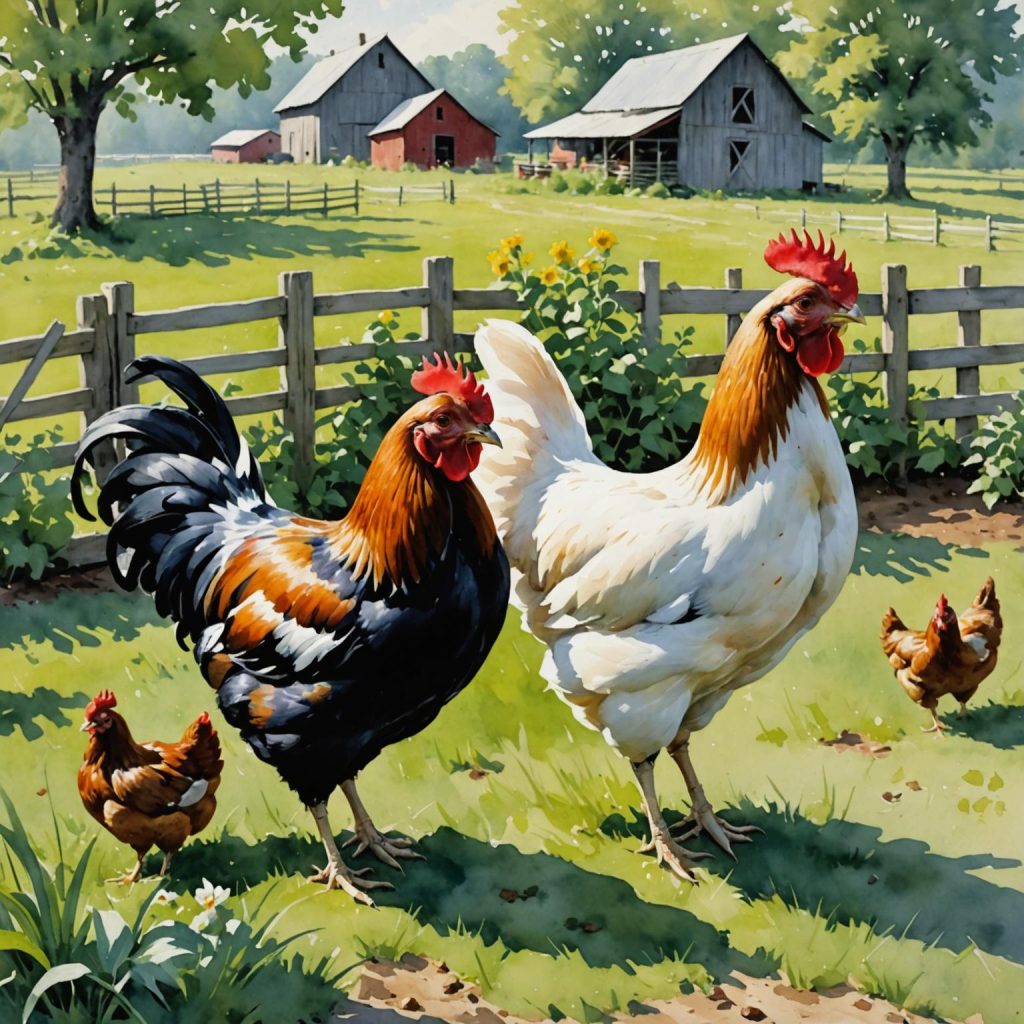When it comes to choosing the right breed of chicken for your yard, there are a few factors to consider. First and foremost, you’ll want to think about the climate in your area. Some breeds are better suited to cold weather, while others thrive in warmer climates. Additionally, you’ll want to consider the size of your yard and the amount of space you have available for your chickens to roam. Some breeds are more suited to free-ranging, while others are content in smaller spaces. Finally, think about what you want from your chickens. Are you primarily interested in egg production, or are you looking for a breed that is known for its meat? By considering these factors, you can narrow down your options and choose the breed that is best suited to your specific needs and circumstances.
Another important consideration when choosing a breed of chicken is temperament. Some breeds are known for being docile and friendly, making them great for families with children. Other breeds are more independent and can be skittish around humans. If you plan on handling your chickens frequently, you’ll want to choose a breed that is known for being calm and easy to handle. Additionally, consider the noise level of the breed. Some chickens are more vocal than others, so if you live in a densely populated area, you may want to choose a quieter breed to avoid disturbing your neighbors. By taking the time to research different breeds and consider these factors, you can ensure that you choose the right breed of chicken for your yard.
Table of Contents
- 1 Building a Coop: Tips for Creating a Safe and Comfortable Home for Your Chickens
- 2 Feeding and Caring for Your Chickens: What You Need to Know
- 3 Keeping Your Chickens Healthy: Common Issues and How to Address Them
- 4 Collecting and Storing Fresh Eggs: Best Practices for Enjoying Your Homegrown Eggs
- 5 Integrating Chickens into Your Yard: Tips for Coexisting with Your Feathered Friends
- 6 The Benefits of Keeping Chickens: How They Can Enhance Your Yard and Provide Fresh Eggs
Building a Coop: Tips for Creating a Safe and Comfortable Home for Your Chickens
When it comes to building a coop for your chickens, there are a few key considerations to keep in mind. First and foremost, you’ll want to ensure that the coop is secure and predator-proof. This means using sturdy materials and ensuring that there are no gaps or weak points where predators could gain access. Additionally, consider the size of the coop. Chickens need plenty of space to move around and roost, so be sure to build a coop that is large enough to accommodate the number of chickens you plan on keeping. It’s also important to provide adequate ventilation in the coop to prevent moisture buildup and ensure that your chickens have access to fresh air.
In addition to security and size, consider the layout of the coop. You’ll want to include nesting boxes for your hens to lay their eggs, as well as roosting bars for them to perch on at night. It’s also important to include a designated area for food and water, as well as a space for your chickens to dust bathe. Finally, consider the location of the coop within your yard. You’ll want to place it in an area that is well-drained and not prone to flooding, and that receives plenty of sunlight throughout the day. By taking these factors into consideration and carefully planning the design and construction of your coop, you can create a safe and comfortable home for your chickens.
Feeding and Caring for Your Chickens: What You Need to Know
Feeding and caring for your chickens is an important aspect of keeping them healthy and happy. When it comes to feeding, it’s important to provide your chickens with a balanced diet that meets their nutritional needs. This typically includes a commercial feed that is specifically formulated for laying hens, as well as access to fresh water at all times. In addition to their commercial feed, chickens also benefit from having access to fresh greens and kitchen scraps, which can help supplement their diet and provide them with additional nutrients. It’s also important to provide your chickens with grit, which helps them digest their food, as well as oyster shell or another source of calcium to support egg production.
In addition to feeding, it’s important to regularly clean and maintain your chicken coop. This includes regularly removing soiled bedding and replacing it with fresh material, as well as cleaning and sanitizing the coop on a regular basis. Additionally, be sure to regularly check your chickens for signs of illness or injury, and provide them with any necessary medical care. By taking the time to properly feed and care for your chickens, you can ensure that they remain healthy and happy.
Keeping Your Chickens Healthy: Common Issues and How to Address Them
While chickens are generally hardy animals, there are a few common health issues that can affect them. One of the most common issues is parasites, such as mites and lice, which can cause discomfort and irritation for your chickens. To prevent parasites, be sure to regularly clean and sanitize your coop, as well as provide your chickens with regular dust baths, which can help keep parasites at bay. Additionally, consider using natural remedies such as diatomaceous earth or herbs like garlic and oregano, which can help repel parasites.
Another common health issue in chickens is respiratory illness, which can be caused by poor ventilation or exposure to drafts. To prevent respiratory illness, be sure to provide adequate ventilation in your coop and avoid overcrowding your chickens. Additionally, be mindful of changes in weather and take steps to protect your chickens from extreme temperatures. Finally, be sure to regularly monitor your chickens for signs of illness or injury, and seek veterinary care if necessary. By taking these steps, you can help keep your chickens healthy and prevent common health issues from arising.
Collecting and Storing Fresh Eggs: Best Practices for Enjoying Your Homegrown Eggs
One of the most rewarding aspects of keeping chickens is collecting fresh eggs from your own backyard. When it comes to collecting eggs, it’s important to do so regularly to prevent them from becoming soiled or damaged. Be sure to provide your hens with clean nesting boxes filled with fresh bedding, which will encourage them to lay their eggs in a clean environment. Additionally, be sure to collect eggs promptly after they are laid, as leaving them in the nesting boxes can encourage hens to peck at them or become broody.
Once you’ve collected your eggs, it’s important to store them properly to ensure their freshness and quality. Eggs should be stored in a cool, dry place away from strong odors, such as in the refrigerator or a cool pantry. Be sure to store them with the pointed end down to help maintain their freshness, and use them within a reasonable amount of time to ensure that they are at their best quality. By following these best practices for collecting and storing fresh eggs, you can enjoy delicious homegrown eggs from your own backyard.
Integrating Chickens into Your Yard: Tips for Coexisting with Your Feathered Friends
Integrating chickens into your yard can be a rewarding experience, but it’s important to take steps to ensure that they coexist harmoniously with other aspects of your yard. One important consideration is fencing. Be sure to provide a secure fence around your yard or garden area to prevent your chickens from wandering into areas where they shouldn’t be. Additionally, consider providing designated areas for your chickens to roam and forage, such as a chicken run or fenced-in area where they can safely explore.
Another important aspect of integrating chickens into your yard is managing their waste. Chickens produce manure on a regular basis, so it’s important to have a plan in place for managing it effectively. Consider using the deep litter method in your coop, which involves regularly adding fresh bedding on top of soiled material to create composting conditions that help break down waste naturally. Additionally, consider using chicken manure as fertilizer in your garden or composting it for later use. By taking these steps, you can ensure that your chickens coexist harmoniously with other aspects of your yard.
The Benefits of Keeping Chickens: How They Can Enhance Your Yard and Provide Fresh Eggs
Keeping chickens can offer a wide range of benefits for both you and your yard. One of the most obvious benefits is fresh eggs. Homegrown eggs from free-range chickens are often considered superior in taste and quality compared to store-bought eggs, making them a delicious addition to any meal. Additionally, keeping chickens can also provide valuable fertilizer for your garden or yard. Chicken manure is rich in nutrients that can help improve soil quality and promote healthy plant growth.
In addition to practical benefits, keeping chickens can also enhance the overall ambiance of your yard. Chickens are entertaining animals that can provide hours of enjoyment with their antics and personalities. They also offer natural pest control by eating insects and other pests that may be present in your yard or garden. Finally, keeping chickens can offer a sense of self-sufficiency and connection with nature that many people find rewarding. By considering these benefits, you can see how keeping chickens can enhance your yard and provide fresh eggs for years to come.
In conclusion, keeping chickens in your yard can be a rewarding experience that offers a wide range of benefits. By carefully choosing the right breed of chicken for your specific needs and circumstances, building a secure and comfortable coop, providing proper care and nutrition for your chickens, addressing common health issues, collecting and storing fresh eggs properly, integrating chickens into your yard harmoniously, and enjoying the many benefits they offer, you can create a thriving environment for both yourself and your feathered friends. Whether you’re interested in fresh eggs, natural pest control, or simply enjoying the company of these entertaining animals, keeping chickens can enhance your yard in numerous ways. With careful planning and consideration, you can create a successful chicken-keeping experience that brings joy and satisfaction for years to come.
Meet Walter, the feathered-friend fanatic of Florida! Nestled in the sunshine state, Walter struts through life with his feathered companions, clucking his way to happiness. With a coop that’s fancier than a five-star hotel, he’s the Don Juan of the chicken world. When he’s not teaching his hens to do the cha-cha, you’ll find him in a heated debate with his prized rooster, Sir Clucks-a-Lot. Walter’s poultry passion is no yolk; he’s the sunny-side-up guy you never knew you needed in your flock of friends!







